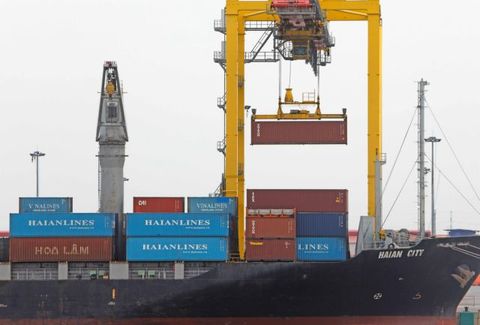
Loading cargo at the Hải Phòng Port in the northern city of Hải Phòng. — VNA/VNS Photo Trần Việt
Businesses have suggested the Government maintain its support to help them overcome difficulties, recover production and business activities, and promote growth, given the fact that many of them still face difficulties despite the country’s GDP growth rate of 6.42 per cent in the first half of this year.
A survey of 30,000 enterprises, recently conducted by the Ministry of Planning and Investment, revealed that 53.8 per cent of the respondents said they have been challenged by low domestic market demand.
Specifically, 43.6 per cent of the enterprises said the competition for sales of goods and services in the domestic market is increasingly fierce, posing great difficulties in seeking outlets for their products.
Meanwhile, 46.9 per cent of those operating in the construction sector have faced difficulties due to a lack of new construction contracts.
Some 27.4 per cent of the businesses surveyed said they have met with challenges due to the hikes in prices of raw materials, fuel, and other input materials, as well as in charges for transportation, warehousing, and other services.
In addition, 21.2 per cent found it hard to access loans for business operations, and 19.7 per cent lamented that lending interests, despite recent cuts, remained high.
About 18.1 per cent said they have struggled with shortages of raw materials and fuel for production, while 14.7 per cent said that administrative procedures, business conditions, and bidding processes remain complicated and overlapping, considerably affecting their production and business activities.
Dr. Nguyễn Quốc Việt, deputy director of the Institute of Economic and Policy Research at the Vietnam National University-Hà Nội, identified two factors directly impacting the consumption of goods by domestic enterprises.
Firstly, businesses and individuals have tightened their spending and investment on account of concerns about economic growth prospects, which is reflected in the low credit growth index but a high amount of bank deposits in the first six months of the year.
Secondly, the strong development of e-commerce has allowed cheap goods from abroad, not just from China, to crowd out domestic products.
In June, the National Assembly decided to continue reducing value added tax (VAT) by two percentage points for some groups of goods and services until December 31, 2024, in an effort to help stimulate consumption and support businesses in sales of products for the rest of this year.
However, many experts thought that the VAT reduction policy should be extended until the end of 2025 to effectively stimulate demand and promote sales.
Nguyễn Bích Lâm, former general director of the GSO, recommended that the reduction rate should be higher than two percentage points, if conditions permit, to make it more significant and stimulating for consumers to spend more on goods and services.
According to Deputy Chairman of the Vietnam Chamber of Commerce and Industry (VCCI) Nguyễn Quang Vinh, to drive economic recovery and growth, it is crucial to focus on traditional growth drivers and explore new ones.
The Government should review and adjust its policies to effectively support enterprises’ development based on practical needs, thus helping them enhance their quality and operation efficiency, enabling them to rebuild their production and business plans and seize opportunities for post-pandemic recovery and development.
Vinh also proposed ministries, sectors, and localities continue implementing tax reduction policies, accelerating the disbursement of public investment, and introducing measures to reduce costs for businesses, and increase their access to State support packages. — VNS